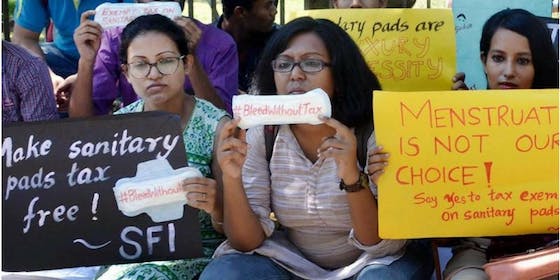
The Indian Government finally scraped off taxes on sanitary pads. Isn’t that amazing? I personally consider this as a huge victory for women and girls.
What is GST (Goods and Services Tax)?
Thanks to the GST, each product sold in India attracts the same tax rate across the country, divided into five tax brackets ranging from 0% to 28%. While contraceptives are exempt, sanitary pads were taxed at 12%. This raised a huge protest in India and rightly so.
Now is a good time to create awareness about menstrual hygiene. 43% of women in India still do not have access to sanitary pads. If you know of someone who uses cloth, encourage them to use pads. Pads are way more hygienic than cloth. On one spectrum we have people who use advanced products like menstrual cups and on the other hand, there is still a huge population using traditional means like cloth, sand, leaves etc.
Why sanitary pads over cloth?
62% of women (aged 15-24) in India still use cloth when menstruating. Cloth, if used, needs changing 4 to 6 times a day. The cloth needs washing in a sufficient amount of hot water and clear sunlight before re-using it. Also, one should not use the same cloth for more than 3 months maximum. If one of the above instructions is not followed, the probability of skin infection is pretty high. On the other hand, sanitary pads are use and throw, which is a lot more convenient than cloth. Girls going to school, colleges, and work would feel more comfortable using pads as opposed to cloth. Pads are a lot more hygienic because the probability of infection is very low. Most importantly, the Government’s relaxation on taxes sends a strong message about the importance of using pads.
Myths around menstruation
I have listed below the age-old myths and their appropriateness in the current day world.
1. Women should not go to temple or religious places during periods
Women are believed to be absorbing all forms of energy at very high levels during periods. So, in order to stay away from negative energy, women were advised not to go to temples because there will be a large number of people in temples and there is a high probability of absorbing negative energy from people around.
Since this is concerned with religion, people have a lot of inhibitions about changing this practice. It is totally up to each individual to decide on this. My only request to every woman is this: Please do your research and figure out for yourself to know if you need to follow these in today’s world. Blindly following such practices is what leads to superstition which is the last thing we want in today’s world.
2. Women should not enter into the kitchen or touch utensils used by others
The very reason this practice came into existence was to give time to rest for women since they did all the household work all by themselves. This is the same reason why women are advised not to have sex during periods.
3. Women should stay in closed doors during periods
Before I address this issue, please note that in olden days, people were living in forests alongside wild animals and there was no concept of sanitary pads in olden days. When using cloth, the woman smells of blood during her period. Animals can smell blood way faster than humans. In such a case, the bleeding from a woman’s body makes her an easy prey to the wild animals. It is for this reason, women were told to stay in closed spaces. I personally believe that this is not at all necessary in the current day world
With respect to the above myths, there is no one right answer. I just request every woman to do your own research to figure out if you’re comfortable following these practices.
The reason I chose to dedicate this article to menstruation awareness is that there are many girls in villages of India who do not attend school once their menstrual cycle kicks in. They consider menstruation as a disease, an embarrassing thing. Girls are easily embarrassed about stains. They are shy to discuss menstruation with men. Menstruation is not a bad thing.
I got a lot of awareness about menstrual hygiene primarily because of the organization named SWADD. This organization empowers women. One of their major objectives is to empower every woman in surrounding villages to use sanitary napkins. Poverty and lack of awareness are the 2 primary reasons women do not use sanitary pads. SWADD produces low-cost sanitary pads and tries to sell them at an affordable price to women. They even conduct sanitation awareness campaign and give away free pads in order to raise menstrual awareness. Impressed by their goal, I joined them to conduct an awareness campaign in one of the villages. It was definitely a great experience getting to know rural women and working with them. They are people who really need our help.
Conclusion
I would like to conclude by stressing on 3 important things:
- Don’t stop a girl’s education just because she starts menstruating. It is not a disease.
- Don’t be ashamed to talk about it, even to men. It biological and nothing to be ashamed of.
- There are a lot of myths surrounding menstrual practices. What matters is what you choose to follow.
The Author

Saisruthi is a software engineer by profession who considers “Strong Independent Feminist” as her identity. Women empowerment is her goal in life and would love to jump in for anything contributing towards it. She is a blogger blogging about Feminism for almost a year now. She loves to read books, most of them non-fiction, especially books themed around feminism, judiciary and Indian Political system.
Photo Credit: Hindustan Times
